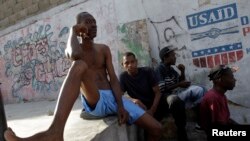The political and social instability that has roiled Haiti in recent months has added to the long-standing problems faced by the nearly 11 million people who live in the poorest country in the Western Hemisphere. Volatile and, at times, violent conditions are a challenge to the U.S. Agency for International Development’s (USAID) effort to help build a stable and economically viable Haiti.
But as John Barsa, the Assistant Administrator for USAID’s Bureau for Latin America and the Caribbean, noted, “The bonds of affection between the U.S. and the Haitian people are solid and they’re not going to go away:”
“So we will always do what we can from country to country to help the Haitian people. . . We will always be there to assist.”
In response to the heightened food insecurity in Haiti, USAID contributed $26.2 million for emergency food assistance programs in FY19 and FY20. This includes the release of 4,600 metric tons of emergency in-kind food assistance distributed by USAID partner UN World Food Program to meet the immediate food needs of approximately 200,000 vulnerable Haitians. It also includes the provision of food vouchers and cash transfers for food to more than 144,000 of the most food insecure Haitians.
Assistant Administrator Barsa said he wished such contributions were unnecessary:
“I would much rather that these Haitian people we’re feeding right now were able to have their own plots of land to grow food, and have a system in place where they wouldn’t have to depend on external hands to feed them.”
In addition to much needed humanitarian aid, U.S. assistance to Haiti focuses on promoting long-term reconstruction and development, economic growth, job creation, and agricultural development. It also aims to provide basic health care and education services and improve the effectiveness of government.
Currently, USAID is placing added emphasis on working with the private sector to help advance these goals, said Assistant Administrator Barsa:
“With the understanding that it isn’t the government’s job to create jobs, it’s the private sector’s, how can we be a catalyst for that private sector investment? Before that can occur anywhere in the world and especially in Haiti, the private sector has to feel it’s a safe place to invest and do business. . .You cannot do development work without having a stable civil society and a secure place to do business.”
Assistant Administrator Barsa said that the U.S. emphasis on the need to strengthen civil society and democratic governance in Haiti is the right one, but warned, “We cannot want this more than the Haitians themselves…Haiti will not be able to have economic prosperity until some of the most basic governance issues are resolved first.”














